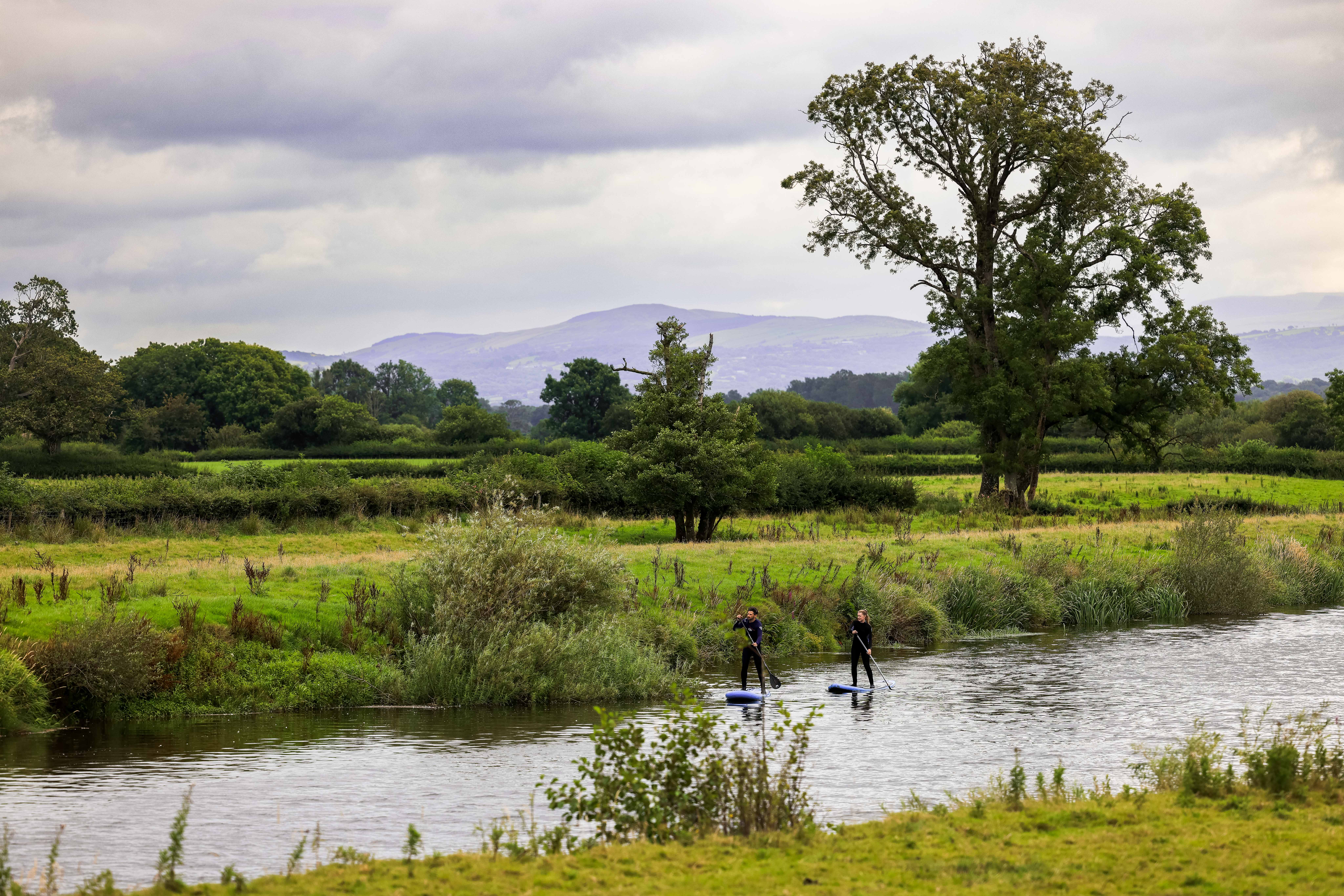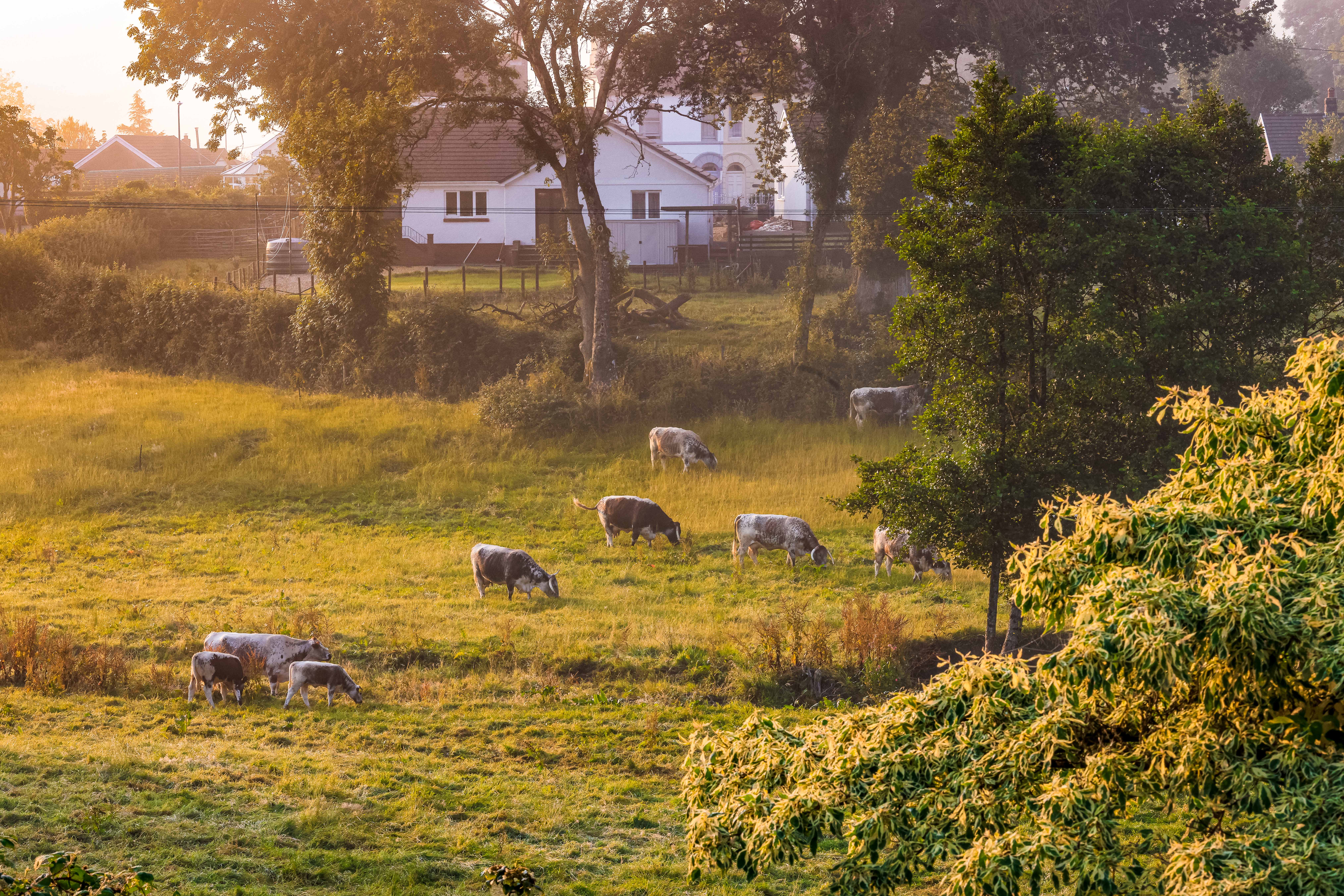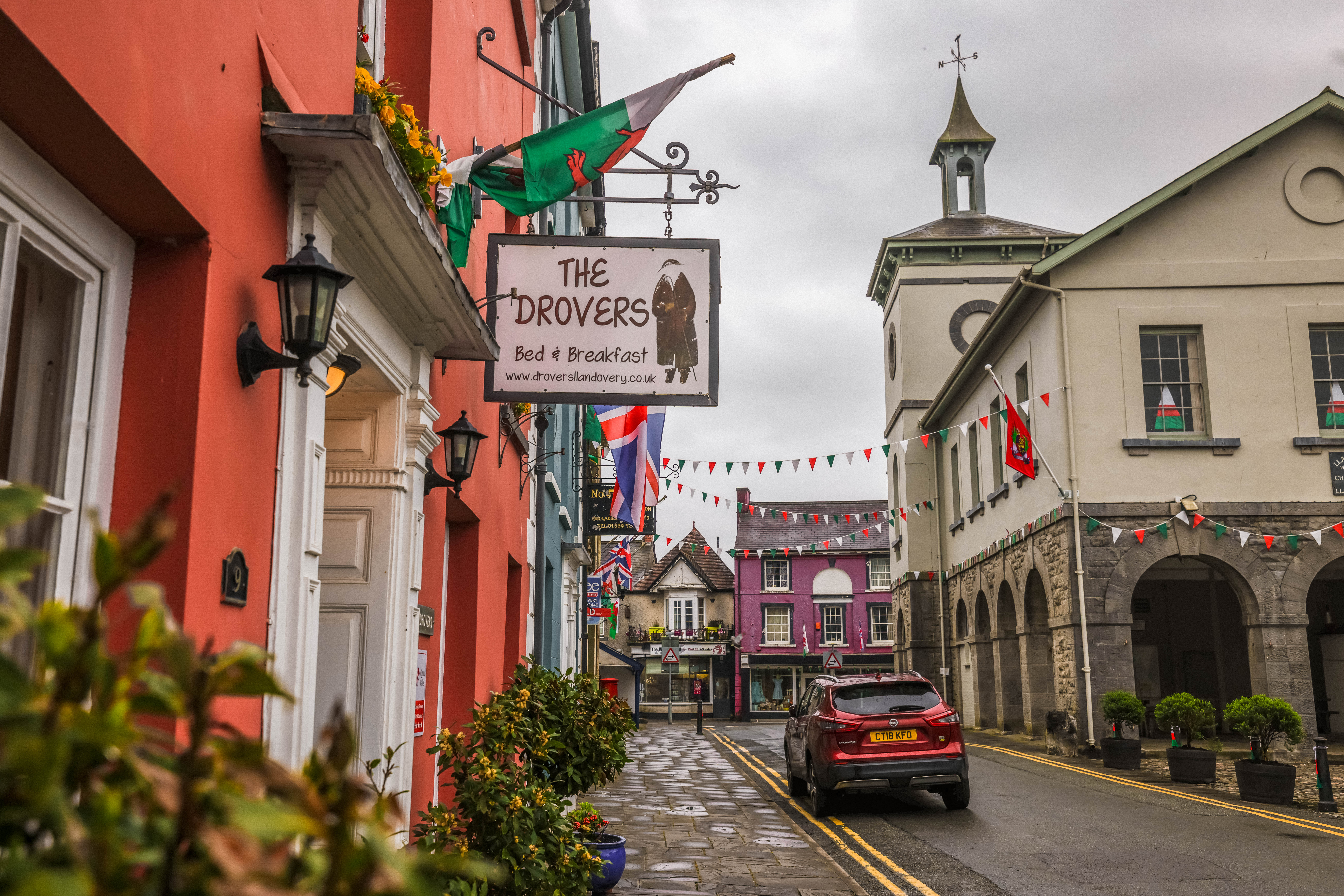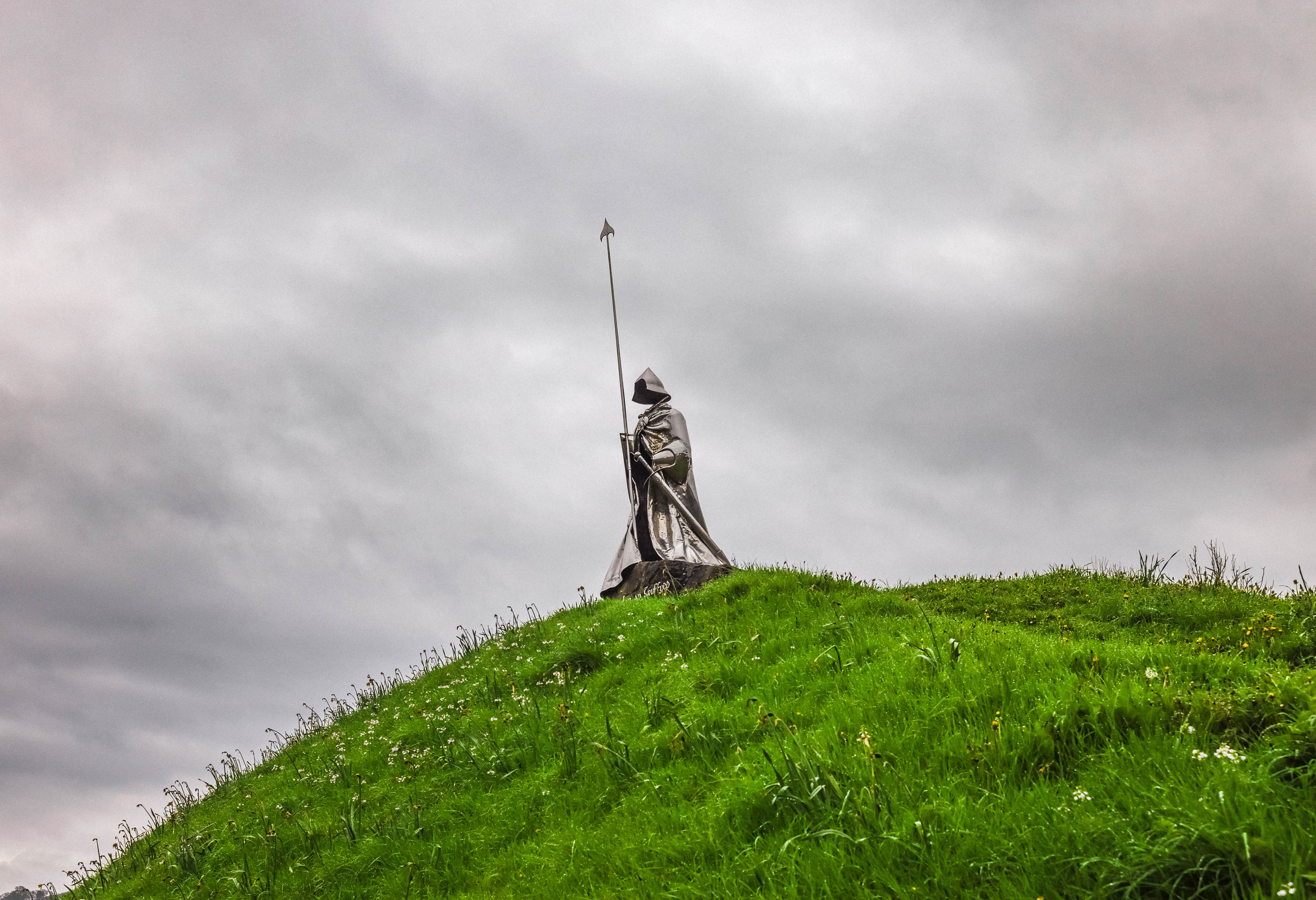
In the space of seven miles, I’ve driven past countryside that has more landmarks than I know what to do with. Two hilltop castles romantically rise above a verdant valley brimming with grazing sheep and milk cows. Georgian houses with soft hues of purple, pink and blue conceal a medieval deer park. Skirting around all this, like a warden keeping everything in check, is the mighty Tywi (Towy) – the longest river in Wales – and above is a neo-Gothic tower that was once bright pink. The folly’s ostentatious architecture likewise casts shadows over award-winning restaurants.
This expanse of the Tywi Valley sits in Carmarthenshire (Sir Gâr), recognised as the “Garden of Wales”. It was once the heart of the Kingdom of Deheubarth, whose rulers established today’s Wales. However, nowadays this road, much like the rest of the county, is often only used to reach Wales’s big hitters: Pembrokeshire, the Brecon Beacons and Powys. But with so much packed in within a short distance, it’s clear Carmarthenshire is worth exploring. As I soon discover, every bend, foothill and unassuming town contains historic treasures, surprising legends, enthralling vistas and untold stories revealing the “real” Wales.
To help me discover more of magical Carmarthenshire, I’m following Discover Carmarthenshire’s newly created, three-day, slow-travel road trip called the Wild Drovers’ Way. Covering 180 miles, it’s split into three stages named after drover-associated themes. Local Councillor Gareth John enthuses that the drovers were “an important part of the Welsh economy”, saying this new route is the “perfect theme for [touring] the county’s hidden gems”.

My castle-filled path turns into a quiet backroad where three majestic deer stand in its centre, silently watching my every move. For 30 seconds, the world shrinks to just me and the deer – until the spell is broken by a rusty 4x4 with a clanking sheep-crammed trailer and the animals flee like lightning.
Wildlife and greenery start to subside. Dark Victorian streetlamps, a three-arched 20th-century bridge and remnants of a medieval castle introduce Carmarthen. Known as the oldest town in Wales, with King Arthur associations, its Welsh name, Caerfyrddin, means “Merlin’s Fort”. There’s no sign of mythical beings; however, I do discover a culinary wizard at The Warren, a multi-award-winning, crowd-funded establishment operating on 100 per cent renewable energy. The head chef Dan turns a simple low-carbon beef burger into a feast, paired with a locally sourced salad and crunchy sunflower seeds.
Read more on Wales travel:
- How to spend a day in Roath, Cardiff’s most charming neighbourhood
- Wales travel guide: Everything you need to know before you go
- Best hotels in Wales
Fast-forward to post-lunch, where I continue along the first leg of my journey. It’s titled Llanwenog, presumably after Wales’s native sheep. Their woolly coats bear a striking resemblance to the grass-munching ewes I spy leading to Llansteffan Castle, whose 12th-century crenelated walls once defended the Tywi River.

History continues in abundance at every mile. I pass narrow lanes bordered by ancient-looking hedges taller than my car. Then, as I turn another tight corner, the “timeless, mild, beguiling island” of Laugharne, as described by Dylan Thomas, Wales’s beloved poet, springs into existence. In under an hour, I’ve passed Whitland, a place where the 10th-century King Hywel Dda created the laws we Walians still follow; a vineyard associated with the White House and President John Adams; and Cenarth.
Upon arriving at the last of these, I park opposite the 16th-century, whitewashed White Hart tavern, decorated with a leather coracle traditionally used to fish sea trout (sewin). Much of the town is preoccupied with Cenarth Falls, a collection of waterfalls known for its leaping salmon. Try as I might to spot any, I see nothing except a boisterous bird dipping into the water, snatching an unsuspecting sea creature.
History continues in abundance at every mile. I pass narrow lanes bordered by ancient-looking hedges taller than my car
I can’t stay to watch, though; it’s time to begin stage two, named Balwen (another type of Welsh sheep!). After several tight hairpin turns I call it a day. Thankfully, Newcastle Emlyn is nearby, housing a livestock market indicative of the drovers. I spend the evening at Emlyn Hotel, similar to inns frequented by drovers, where, I learn about how the town’s castle witnessed the death of Wales’s last dragon. Curiosity gets the better of me, and in the soft hues of early morning, I go in search of him. There are no cars on the road, and only walkers in the distance. Newcastle Emlyn’s castle and lifelike dragon sculpture plunge me momentarily back into the Dark Ages and I wonder: will it attack? Just as I think this, a wily teenager jumps out from the dragon’s hollow core, and I jump about metre in the air.
Next up, I head for in Llandovery – the drover epicentre – where, at one point, more than 30,000 cows were driven from here to England. Overlooking the town square is the Kings Head Inn, formally a drover bank called Yr Eidion Du (Bank of the Black Ox), and The Drover’s B&B. Unfortunately, I can’t investigate these further, as my car breaks down. Like the drovers before me, I fix the problem with my bare hands. Overlooking my endeavours is a 16ft stainless-steel statue of Llywelyn ap Gruffydd Fychan, the “Welsh Braveheart”, who stood against the English. A stern-looking drover statue, with a whiskered beard, long coat and stick, also towers nearby.

The next morning, I embark on the final route: Black Ox. This leg is wild and uninhabited, passing Wales’s most romantic ruin, Carreg Cennen Castle. At times it feels like No Man’s Land, but it’s only the brooding Brecon Beacons, where rocky terrain leaves me skidding and sharply braking before a modern-day farmer who’s chasing sheep. A thick fog descends, so I continue to Kidwelly, where I find the haunting, riverside silhouette of Kidwelly Castle. It’s known for featuring in Monty Python and the Holy Grail. But, for me, it’s more important that it’s remembered as the site where Wales’s only warrior princess, Gwenllian, led an army against the English.
Outside the gatehouse, there is a monument honouring her. As I look upon its steadfast structure, I realise that it’s the unsung heroes like Gwenllian, the “Welsh Braveheart”, and drovers that make Carmarthenshire Wales’s best-kept secret.

Travel essentials
Staying there
In Laugharne, The Dylan Coastal Resort offers lodges starting from £349; luxurylodges.com/dylan-coastal-resort
In Newcastle Emlyn, The Emlyn Hotel has 29 hotel rooms with doubles; emlynhotel.co.uk
Rooms available from{{#price}}{{price}}per night{{/price}}{{^price}}Check availability for dates and prices{{/price}}
Rates provided by Booking.com
Llandovery has The Drovers B&B, with single rooms and double/twin en-suites; droversllandovery.co.uk
Rooms available from{{#price}}{{price}}per night{{/price}}{{^price}}Check availability for dates and prices{{/price}}
Rates provided by Booking.com
More information
Download The Wild Drovers’ Way route here.
Read more of our best Wales hotel reviews







